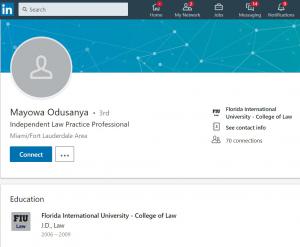Legal Analyst Mayowa F. Odusanya publishes article on traditional legal research methods
Legal research requires a lot more concentration than other types of research due to the different conclusions that are possible, notes Mayowa Odusanya
Mayowa Odusanya (N/A:N/A)
There are no second opinions about the fact that conducting legal research can be extremely difficult regardless of the sources that you might have access to. There are a number of different aspects that need to be taken into consideration when conducting legal research. This is because there are a lot of different directions that you can take with legal research, and it is absolutely imperative for you to take all factors and aspects into consideration when you’re dealing with legal documents and cases since even the slightest discrepancy can amount to a lot.
Needless to say, legal research requires a lot more concentration and diligence than other types of research due to the different conclusions that are possible with minor tweaking. What’s more, since there’s a lot more material that you need to go through when it comes to legal research, you need to be absolutely certain that your sources are not only credible and authoritative, but also relevant to the problem at hand.
Another common problem that researchers and people interested in legal issues face is that of contradictory information available online. Additionally, in most cases, credible information online comes with a literal price to pay. What this means is that most online platforms that contain credible legal information expect you to pay a fee to be granted access or authority to view the content.
Interested in learning more about how you can go about conducting legal research the right way? Read on to find out as we tell you all about the different steps that you should take to conduct legal research the traditional way without relying on online sources for best results.
Conducting legal research the traditional way
Contrary to popular belief, the path you follow for legal research will be based on a number of different factors. What this means that there is no single path that’s set in stone that absolutely must be followed in case you need to conduct legal research.
With that said, while there are certain common and extremely popular steps that are generally followed by anyone who wishes to conduct legal research, it’s important to note that these steps may or may not be followed in a sequential fashion for each scenario. This essentially means that while certain scenarios may require you to follow the steps listed below in the exact order, you may choose to play around for other cases – and that will not affect the results of your research.
Before you start conducting legal research, it’s important for you to know that you will be expected to revisit certain sources of information for increased clarity. What’s more, you might even be expected to check certain sources of information a number of times due to exceptions. Even in the case of exceptions, you will have to double-check whether the conditions of the exception apply to your particular case, and if there is any way that the exception can be worked around for your particular scenario.
Here are some of the steps that you are advised to follow when conducting legal research without the use of the internet:
Identify the problem
The number one reason why people are unable to conduct thorough research is the fact that they do not pay enough attention to the initial phase of the process. It goes without saying that identifying the problem and its scope is of key importance when you’re interested in conducting legal research as doing so will essentially set the precedent and give you an idea of how thorough your research must be.
When you’re trying to identify the problem and its scope, it’s also important to ask questions that are highly specific and will give you a clear understanding of the jurisdiction, search terms, and time period that is applicable or relevant to the problem. By doing so, instead of being confused by all of the options that you have available, it will be possible for you to get a better sense of direction to start taking the most appropriate path for conducting your research.
Visit secondary sources of information
Unlike primary sources, secondary law or sources of information are bound to help you understand how your specific scenario is also relevant for a much broader context. What’s more, once you start browsing through secondary sources of information, it will be far easier for you to visit primary sources that are relevant to your particular scenario and can help you gain greater understanding for the scope in question.
By consulting secondary sources of information, it will also be possible for you to get references to citations and statutes that will help you gain the right information regarding your legal research.
Identify relevant information
Once you have done your fair share of research through secondary sources, it will be far easier for you to identify relevant statutes that will help you in gaining the information that you need for your legal research of a particular scope, question, or scenario. By identifying relevant statutes, you can get into greater detail and start browsing through to find other sections that may be relevant or could potentially add value to your legal research.
In addition to finding the right statutes for the legal research of your particular scenario, you can also browse through cases in digests and find ones that may contain relevant information to ensure that all aspects of research are covered.
Keep tabs
Keeping track of all of the documents that you have already been through is extremely essential to ensure that you do not have to resort to the same cases and documents over and over again. It’s also important to note that you must do so regardless of whether or not you have retrieved any relevant information from the source.
Now that you know of all of the steps that you need to follow to conduct research the traditional way, it will be easy for you to figure out how you want to proceed with looking for legal information.
About Mayowa F. Odusanya
Mayowa Odusanya is an expert in the fields of criminal law and real estate. Florida International University, College of Law, Juris Doctor, 2009. Florida A. & M. University, B.S., 2005. Former work experience includes the Miami Dade Public Defender's Office; and the law firm of Walton, Jones & Browne, P.A.
https://solomonlawguild.com/mayowa-odusanya
Blog: https://modusanya.blogspot.com/
https://www.linkedin.com/in/mayowa-odusanya-63663322/
https://www.lawyerstotherescueblog.com/lawyer-to-the-rescue-high-scho/
News: https://hype.news/mayowa-f-odusanya/
Mayowa F. Odusanya
Mayowa F. Odusanya
+1 813-598-3870
email us here
Visit us on social media:
LinkedIn
Dean Sonderegger, Vice President, Legal Markets, Wolters Kluwer Legal & Regulatory Solutions, Today's Law Firm Library: Navigating Traditional Research
Legal Disclaimer:
EIN Presswire provides this news content "as is" without warranty of any kind. We do not accept any responsibility or liability for the accuracy, content, images, videos, licenses, completeness, legality, or reliability of the information contained in this article. If you have any complaints or copyright issues related to this article, kindly contact the author above.





